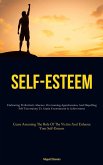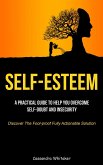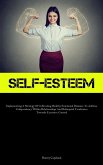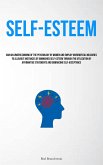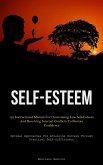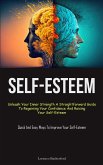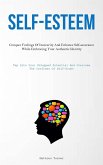Self-Esteem: Is good self-esteem perhaps the most important aspect in being as happy as possible? Dr. Nathaniel Branden, a late expert on self-esteem, thought so. This book is a very short summary of my ideas on self-esteem, after having read various books on the topic, and having pondered and written up notes for decades, on this topic. The author seeks to take the mystery out of this very vague term - self-esteem. He regards his self-esteem as having been very, very low, for most of his life, despite some considerable talents from childhood onward. The book ties into the topic of shame, by the way. It also ties into the topics of love, self-love, and acceptance. The book takes the view that self-esteem likely is made up of two components: First, to realize that every aspect of ourselves is "perfect", in the sense that every detail is exactly as The Laws of the Universe dictate that they be, without any variance. For those who are spiritually minded, the phrase "God does not make Junk", might come to mind. Or for those of a rather scientific bent, we might consider the phrase of a famous physicist: "God does not play dice with the Universe" [and thus with who we are, too, as part of this Universe - author's words added]. Secondly, we surely desire to be useful to at least some other people, if at all possible; the author then explores the ways that this usually plays out. He presents a useful summary of how we strive to be useful. The author views this topic through the lenses of having had a very strict religious upbringing, and having had very perfectionistic parents, and how these facets played negatively upon his self-esteem. He also views the topic through the lens of a mathematician and engineer, having studied fifteen courses of mathematics, starting at the age of 41, and paying the tuition for these courses by tutoring for the college's Mathematics department for three years; he also studied electrical engineering at West Point, and at the age of 27, briefly worked as an engineer for a small firm in San Diego, California. He also views the topic through the lens of psychoanalysis, having spent 150 sessions in psychoanalysis with two medical doctors in his twenties, first in Kentucky, then the final one hundred sessions in San Diego, California. The last one hundred sessions were not your standard Freudian analysis, though, having incorporated cognitive therapy ideas in the analysis, yet done six days a week, all the same, and by a Jewish physician, interestingly.
Hinweis: Dieser Artikel kann nur an eine deutsche Lieferadresse ausgeliefert werden.
Hinweis: Dieser Artikel kann nur an eine deutsche Lieferadresse ausgeliefert werden.


